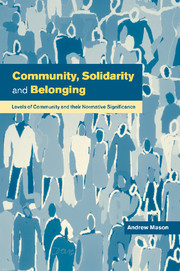Book contents
- Frontmatter
- Contents
- Acknowledgements
- Introduction
- Part 1 Community and its value
- Part 2 Political community in a culturally diverse society
- Part 3 Political community and the limits of global community
- 7 The ideal of global community and the principle of non-intervention
- 8 Political communities, global solidarity and the state system
- Conclusion
- Bibliography
- Index
8 - Political communities, global solidarity and the state system
Published online by Cambridge University Press: 22 September 2009
- Frontmatter
- Contents
- Acknowledgements
- Introduction
- Part 1 Community and its value
- Part 2 Political community in a culturally diverse society
- Part 3 Political community and the limits of global community
- 7 The ideal of global community and the principle of non-intervention
- 8 Political communities, global solidarity and the state system
- Conclusion
- Bibliography
- Index
Summary
The troubled relationship between political community and liberal ideals of global community is helped by revising the principle of non-intervention so that it permits humanitarian intervention in some cases. But many theorists have thought that the relationship will always be fundamentally unhappy because ‘the state system’ places structural obstacles in the path of these ideals. The existence of a plurality of political communities in the absence of an overarching authority is seen as undermining the conditions necessary for the realization of liberal visions of global community.
I shall not aim to resolve the issue of whether there is a systemic conflict of this kind. Instead I shall try to clarify the way in which the ‘anarchic’ structure of the state system might be thought to stand in the way of liberal ideals of global community, and raise some doubts about whether it always constitutes a serious obstacle to them. I shall then entertain various alternative theories which place much of the blame elsewhere, in the nature or internal structure of the political units which make up the state system. Some of these theories recommend radical changes to those units, and blur the boundary between changing the structure of the system and changing the nature of its constituent parts.
- Type
- Chapter
- Information
- Community, Solidarity and BelongingLevels of Community and their Normative Significance, pp. 201 - 223Publisher: Cambridge University PressPrint publication year: 2000



